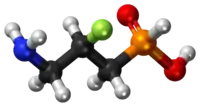Lesogaberan
Lesogaberan (AZD-3355) was[1] an experimental drug candidate developed by AstraZeneca for the treatment of gastroesophageal reflux disease (GERD).[2] As a GABAB receptor agonist,[3] it has the same mechanism of action as baclofen, but is anticipated to have fewer of the central nervous system side effects that limit the clinical use of baclofen for the treatment of GERD.[4]
 | |
 | |
| Names | |
|---|---|
| Preferred IUPAC name
[(2R)-3-Amino-2-fluoropropyl]phosphinic acid | |
| Other names
AZD-3355 | |
| Identifiers | |
CAS Number |
|
3D model (JSmol) |
|
| ChEMBL | |
| ChemSpider | |
| ECHA InfoCard | 100.133.162 |
PubChem CID |
|
| UNII | |
CompTox Dashboard (EPA) |
|
InChI
| |
SMILES
| |
| Properties | |
Chemical formula |
C3H9FNO2P |
| Molar mass | 141.082 g·mol−1 |
Except where otherwise noted, data are given for materials in their standard state (at 25 °C [77 °F], 100 kPa).
Infobox references | |
References
- AstraZeneca. "AZD3355". Retrieved 30 December 2011.
- Bredenoord, Albert J. (2009). "Lesogaberan, a GABAB agonist for the potential treatment of gastroesophageal reflux disease". IDrugs. 12 (9): 576–584. PMID 19697277.
- Alstermark; Amin, K; Dinn, SR; et al. (2008). "Synthesis and Pharmacological Evaluation of Novel γ-Aminobutyric Acid Type B (GABAB) Receptor Agonists as Gastroesophageal Reflux Inhibitors". Journal of Medicinal Chemistry. 51 (14): 4315–4320. doi:10.1021/jm701425k. PMID 18578471.
- Brian E. Lacy; Robert Chehade; Michael D. Crowell (2010). "Lesogaberan". Drugs of the Future. 35 (12): 987–992. doi:10.1358/dof.2010.035.012.1540661.
This article is issued from Wikipedia. The text is licensed under Creative Commons - Attribution - Sharealike. Additional terms may apply for the media files.